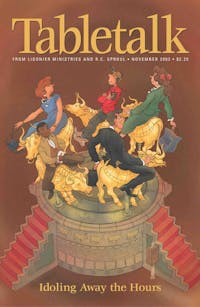
Request your free, three-month trial to Tabletalk magazine. You’ll receive the print issue monthly and gain immediate digital access to decades of archives. This trial is risk-free. No credit card required.
Try Tabletalk NowAlready receive Tabletalk magazine every month?
Verify your email address to gain unlimited access.
The years leading up to the Scottish Disruption and those immediately afterward produced some of the most remarkable servants of God in the history of the church. Andrew Alexander Bonar (1810–1892) was a member of that galaxy of brilliant, Reformed Scots preachers, writers, and missionaries that included his brothers John, James, and Horatius, as well as Robert Murray McCheyne, John Urquhart, Rabbi John Duncan, Alexander Duff, and William Sinclair Mackay. They were bound together by a common cause, in a common time, with a common vision, by a common love. Together these men came to be known variously as the “Evangelical Prodigies,” and the “School of the Saints.”
Bonar was the scion of a prominent and pious Presbyterian family. Like most of the other members of that esteemed Disruption circle, he was most profoundly influenced by the life, work, and ministry of Thomas Chalmers (1780–1847). He grew up under the shadow of Chalmers, who was indisputably the greatest preacher, theologian, and reformer of the day—and according to Alister McGrath, “the virtual re-founder of Scots Presbyterianism.” He then studied under Chalmers at Edinburgh, stood with him during the Disruption, worked with him in the establishment of the Free Church, and continued his legacy in missions and parish renewal.
Bonar’s long and fruitful ministry afterward was remarkable not only for his achievements in writing, hymnody, evangelism, missions organization and support, and pastoral effectiveness, but also for his personal piety and holiness. His great concern to guard against “the idol factory in my heart,” utilizing Calvin’s vivid phrase, was evident at every turn. His books and sermons were filled with the theme.
How different is the temperament of the modern church. The erosion of the distinctiveness of the Gospel and the subversion of the idea of holiness has wrought an avalanche of decadence. The moral practices of the average Christian today are not discernibly different from the average non-Christian. And we are adamant in refusing to admit as much. Our gaze is steadfastly averted from the golden calves we have been busy erecting around us.
Perhaps that is why Bonar’s experience seems so remote to us. To our modern ears, his painful self-examination seems overwrought; his fierce denunciations of sins we hardly notice seems wildly exaggerated in light of his disciplined attention to holiness; his alertness to his proclivity to idolatry seems melodramatic. “I lament the sins of coldness and earthliness; wandering in prayer; seeking to benefit others without being benefited myself; something of discontent at little annoyances; chagrin and envy; opportunities lost; sick persons ill-advised; my class of young people too little taught of Christ; and in all my preaching very inadequate setting forth of Christ and the Spirit.” And again, “Tried this morning specially to pray against idols in the shape of my books and studies. These encroach upon my direct communion with God, and need to be watched.” And yet again, “I see myself selfish, hard-hearted, with very little zeal, and still less pity for souls. I easily see awful wants in my ministry and awful omissions. I feel that I am clothed in filthy garments.”
Of course, Bonar’s distinctive ministry was not merely rooted in an individualistic vision of pious introspection. For him, personal holiness was the foundation upon which a ministry within the covenant community and without, to the lost, was to be built. Identifying “idols for destruction” in his own life was merely a prelude for him to identify “altars for service unto the lives of others.”
As a result, Bonar came to have a passion for the souls of men. His manse in Collace and the chapel narthex of his parish church in Glasgow were both adorned with the Hebrew script reading, “He that winneth souls is wise.” It was his motto and his mission. It was his mindset and his motivation.
For all his spiritual achievement in the arenas of personal holiness and evangelism, Bonar remained humble. Though he was not insensitive to the gracious appointments of blessing in his life, he was ever more alert to his vices than his virtues; he was all too aware of his idolatrous tendencies over and against his moral victories.
Thus, he would write, “I spent most of this day in reading Dr. Chalmers’ Life—two volumes. In the midst of my reading a man came in to ask me to go with him to settle a quarrel between him and his wife. The Lord does not use me, like his servant Dr. Chalmers, for great things, but my way of serving the Lord is walking three or four miles to quiet a family dispute! The Lord shows me that He wishes me to be one of the common Levites who carry the pins.”
Oh, that the church today had a bevy of such common Levites!
